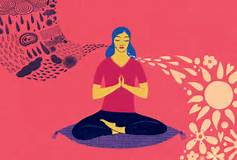I have been practicing Tonglen recently. It is a Compassion practice in which we bring to mind someone who is struggling and imagine breathing in their difficulty – taking it in – and breathing out what will help, all that is good – sending it out. This reverses our usual tendency to want all that is good for ourselves and to get rid of all that is difficult. We do this from a feeling of abundance and joyfulness by first getting in touch with our potential for limitless compassion. We practice breathing in the difficulty into this sense of potential, allowing the difficulty to be transformed there, and then sending out what is needed from this same place of limitless potential. We might imagine breathing in a dark, heavy, hot mist or cloud of suffering and breathing out a bright, clear, fresh light of love and whatever is needed to alleviate the suffering.

It might seem a tricky practice, but if we can find our way with it then it can be incredibly powerful.
I have found it most powerful in my own life in the face of helpless grief and tragedy, where there is nothing that can be done practically or physically to help – I can always practice breathing in the difficulty and breathing out some relief. Something to do to help when I feel helpless.
It helps me to get an embodied understanding of the difficulties of others, particularly those I don’t like, so enabling empathy and compassion to grow.
It helps me to see what my thinking activity projects onto a difficulty – my own or another’s. This thinking activity always elaborates and makes the difficulty worse.
I saw this clearly once on a tram in Manchester on which I was practicing Tonglen on the spot for some of my other passengers. A learning disabled young man got on the tram, with what looked like his gran. I started doing Tonglen for this young man breathing in how difficult I thought his life must be – and how much more difficult I though his life could get once his gran died. I was totally bought into this story of suffering, earnestly breathing it in and breathing out all the help I could. Then I had a moment of insight and clearly saw this young man, as he was in that moment. He was joyfully looking out of the window and sharing with his gran all he saw. I saw clearly how his suffering was my projection, my imagined story about his life – then I laughed. But we are projecting like this all the time – merrily elaborating the suffering of ourselves and others – the human condition! No need to make a big deal out of it.
When we breathe out the joy, love, peace, whatever is needed, the practice is to breathe it all out without keeping any for ourselves, albeit from this stance of joyful abundance. I have often wondered about this – shouldn’t we share what we have, rather than breathing it all away? What about self-compassion?
I had an insight about this earlier this week. It is said that the biggest obstacle to joyfulness is the fear of losing that joy. If you read this blog regularly, you will know that I have been struggling with this fear recently. The Tonglen trains us to breathe out all our joy, all our resources of kindness and compassion. When we experience a moment of joy in daily life, the instruction is to breathe it out to others. I see now how this practice helps us to overcome the fear of losing our joyfulness, by training to imagine giving it all away. So, a further dimension to this amazing practice, which I strongly recommend.
In my experience, and that of all those I teach, Mindfulness helps us to live well, but Compassion transforms our lives so that we can be alive wonderfully.
Have a look at Pema Chodron’s book ‘Start where you are’, which contains some of the best teachings on Compassion and Tonglen which I have read.
If you haven’t done the Level 2 training: Responding with Compassion, consider doing it (click here for more information on our Compassion courses). If you have done this training, consider revisiting the manual and practices, especially Tonglen if you didn’t relate to it well first time around.
So, have a go at sending and taking – Tonglen – I hope it helps you lighten up, see more clearly and be happier, as it has helped me.
Kind Wishes
Heather

